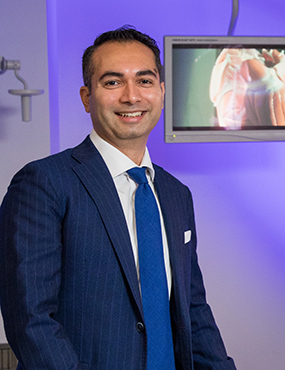Young academic orthopod finds home with us
Associate Professor Sumit Raniga joined Macquarie University Health in 2018 as an employed orthopaedic surgeon. He is now well on the way to developing a world class centre of excellence in shoulder and elbow surgery.

Biomechanics lab improves patient outcomes
As a New Zealander, Associate Professor Sumit Raniga sub-specialised in shoulder and elbow surgery with an aim to work with the All Blacks. But when Macquarie University Health asked him to develop an orthopaedic research program and set up a Shoulder and Elbow clinical practice, he seized the chance to apply his skills for a wider reach.
“I could see a significant opportunity to develop a program that would essentially be groundbreaking in terms of doing translational research in Australasia, and build a unique academic practice from scratch,” Raniga says.
He received a $600,000 research grant to build Asia-Pacific’s first six degree of freedom, eight muscle actuated, cadaveric shoulder simulator. This funding has allowed the assembly of a multidisciplinary team to enable an intensive collaboration between academic shoulder surgeons, radiologists, physiotherapists, biomechanical engineers, basic scientists and industry to improve patient outcomes through translational orthopaedic research.
“The new shoulder biomechanics lab and research program will have a strong focus on improving patient outcomes through evidence-based evolution of all aspects of shoulder surgery and rehabilitation,” says Raniga. “It gives us the basic science evidence to explore what we do, and why we do it and how we could make things better for patients.”
To put his research into practice, he’s established the Shoulder and Elbow Clinic that includes orthopaedic shoulder and elbow specialists, pain specialists, infectious disease specialists, radiologists and physiotherapists. “We’ve basically got a multidisciplinary team to cover every element of patient care,” he says.
Raniga also teaches most of the orthopaedic curriculum in the University’s Doctor of Medicine program, which involves lecturing, and providing clinical and operating theatre experience.
“It’s been an amazing year and a lot of hard work, but I feel really happy that I’m combining my passion to do research and practice evidence-based shoulder and elbow surgery and teach,” he says. “I have no regrets for abandoning my All Blacks dream.”